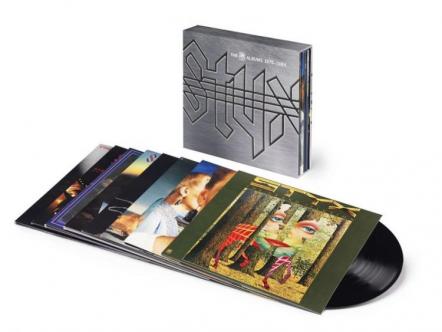New York, NY (Top40 Charts / Universal Music Enterprises) Universal
Music Enterprises will release Styx: The A&M Albums 1975-1984, an eight-disc box set featuring some of the band's most iconic albums, pressed on 180-gram heavyweight vinyl, on May 12. The individual albums will also be available separately as part of the UMe "Back to Black" vinyl reissue series.
The roots of Styx were formed in Roseland on the south side of
Chicago back in 1961 by twin brothers Chuck and John Panozzo on bass guitar and drums respectively, with vocalist/keyboardist
Dennis DeYoung as The Tradewinds, then TW4, with guitarist
James "JY" Young joining in 1970. By '72, when they signed to indie Wooden Nickel Records, they changed their name to Styx because "it was the only one none of us hated," according to DeYoung. The group scored a hit single in "Lady," which hit the Top 10 in the U.S., but it wasn't until signing with A&M Records that the band hits its stride, releasing eight albums in the course of nine years, starting with
Equinox in 1975 and closing with the live Caught in the Act in 1984, while adding guitarist Tommy Shaw in 1976.
Known for melding hard arena-rock basics with metal guitar solos, progressive art flourishes and a highly theatrical stage show, Styx earned four consecutive albums certified multi-platinum by the RIAA, along with 16 Top 40 smashes, including "Renegade," "Come Sail Away," and "Blue Collar Man (Long Nights)." Styx was recently referenced in the hit Netflix series Mozart in the
Jungle when the lead oboist played in the orchestra pit for a fictional juke-box musical based on the band's music called Oedipus Rocks. The eight-album vinyl box set includes the following releases, which are also available individually:
Equinox (1975) was Styx's first album for A&M, and the final one for guitarist John Curulewski, who was replaced by Shaw for the tour. The album's biggest hit was "Lorelei," which was the band's second U.S. Top 30 hit. Another popular song from the album is "Suite
Madame Blue," which was written for America's bicentennial. With its four-part harmonies, it is a staple of the band's live set. Although the album stalled at No. 58, it eventually went gold in 1977.
Crystal Ball (1976) was Styx's first album to feature newest member Tommy Shaw, who made his vocal debut on "Mademoiselle," the album's Top 40 hit. The title track was another regular of the band's live set. Other highlights include "Shooz," co-written by Shaw and Young. Although the album got no higher than No. 66 on the Billboard 100, it eventually went platinum in 1978.
The Grand
Illusion (1977) was the band's most successful album to date, spawning the hit singles, "Come Sail Away" and "Fooling Yourself," eventually selling more than 3 million albums in the U.S., peaking at No. 6 on the Billboard 100. DeYoung described the album's theme as overcoming superficial differences by recognizing "deep inside we're all the same," as the title track put it. The album cover, created by the famed San Francisco team of Alton Kelley and Stanley Mouse, is an homage to a painting by Magritte.
Pieces of Eight (1978) was another concept album, and like The Grand Illusion, it went triple-platinum, selling more than three million copies in the U.S. thanks to the hit singles, "Sing for the Day," "Blue Collar Man (Long Nights)" and "Renegade," also climbing to No. 6 on the Billboard 100.
Cornerstone (1979) marked a significant move away from progressive rock into a more pop-oriented approach.
Dennis DeYoung contributed a pair of ballads to the disc, including the band's only chart-topping pop single, "Babe," which he wrote for his wife. The other singles included "
Borrowed Time" and DeYoung's "Why Me," which hit the Top 30. Shaw's folk-rocking "Boat on the River" became the band's biggest European hit. The album peaked at No. 2 on the Billboard 100, the band's first Top 5 album and was the group's third straight triple-platinum release.
Paradise Theater (1981) is a concept album - the band's only No. 1 album - a fictional account of the
Chicago theater of the same name, described by DeYoung as a metaphor for America's changes in the '70s and early '80s. The album contains four chart singles: DeYoung's "The Best of Times" (No. 3 on Billboard 100), Shaw's "Too Much Time on My Hands" (No. 9), "Nothing Ever Goes As Planned" (No. 54) and "Rockin' the Paradise" (No. 10 on Top Rock Tracks chart). It turned into the band's fourth consecutive triple-platinum album.
Kilroy Was Here (1983) was the final studio album released by the classic lineup of
Dennis DeYoung, Tommy Shaw,
James Young and the Panozzo brothers, another rock opera about a futuristic fascist government that tries to outlaw rock 'n' roll. The single "Mr. Roboto" went to No. 3 on the Billboard 100 and No. 3 on the Mainstream Rock chart, while "Don't Let It End" reached No. 6 on the Pop singles chart and No.13 at Adult Contemporary. The album peaked at No. 3 on the Billboard chart and sold more than a million copies, though its keyboard-heavy sound caused a schism between DeYoung and guitarists Shaw and Young. Three of the four videos - "Mr. Roboto," "Don't Let It End" and "Heavy Metal Poisoning" - were shot at the same time, and used as a mini-film which opened up the live tour of the album.
Caught In The Act (1984) was a double-live album that captured the band's Kilroy Was Here tour, with one new song, "Music Time," which hit the Top 40 of the Billboard 100. The album hit No. 31. It would be the last Styx album until 1990's Edge of the Century, recorded after Tommy Shaw left the band.




















